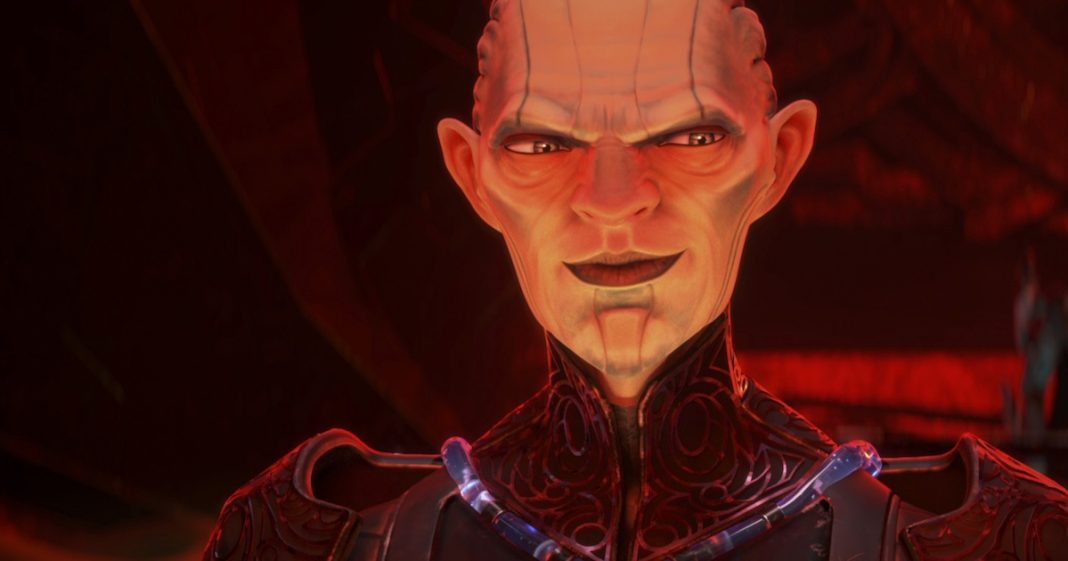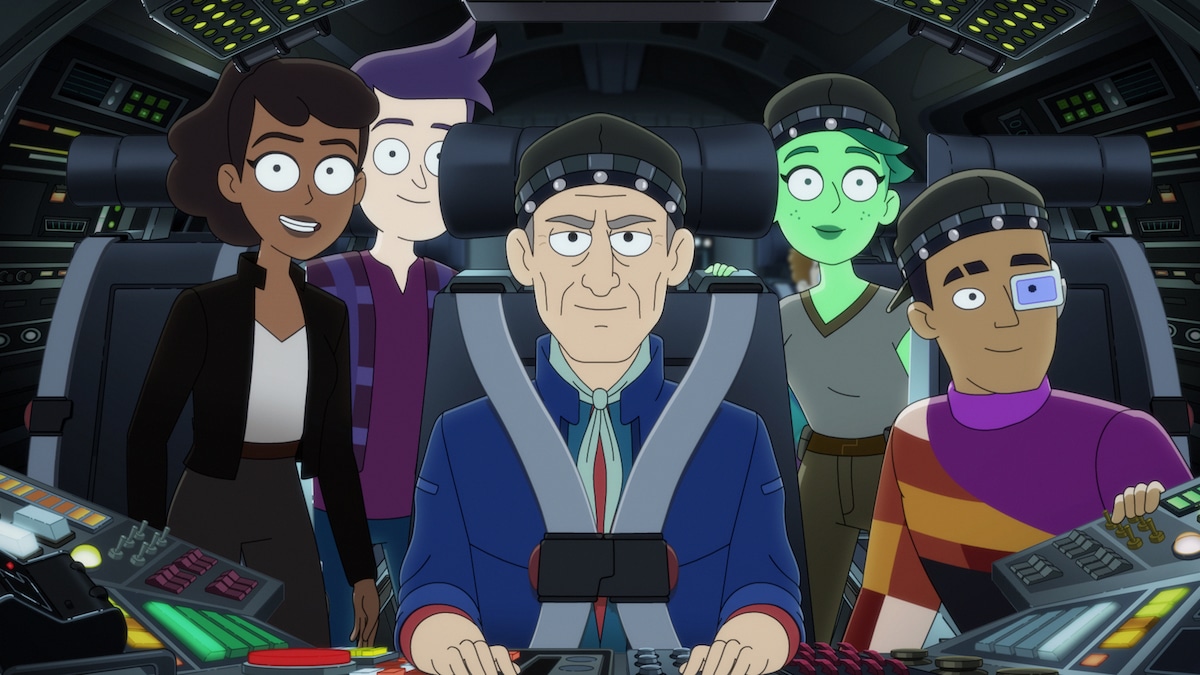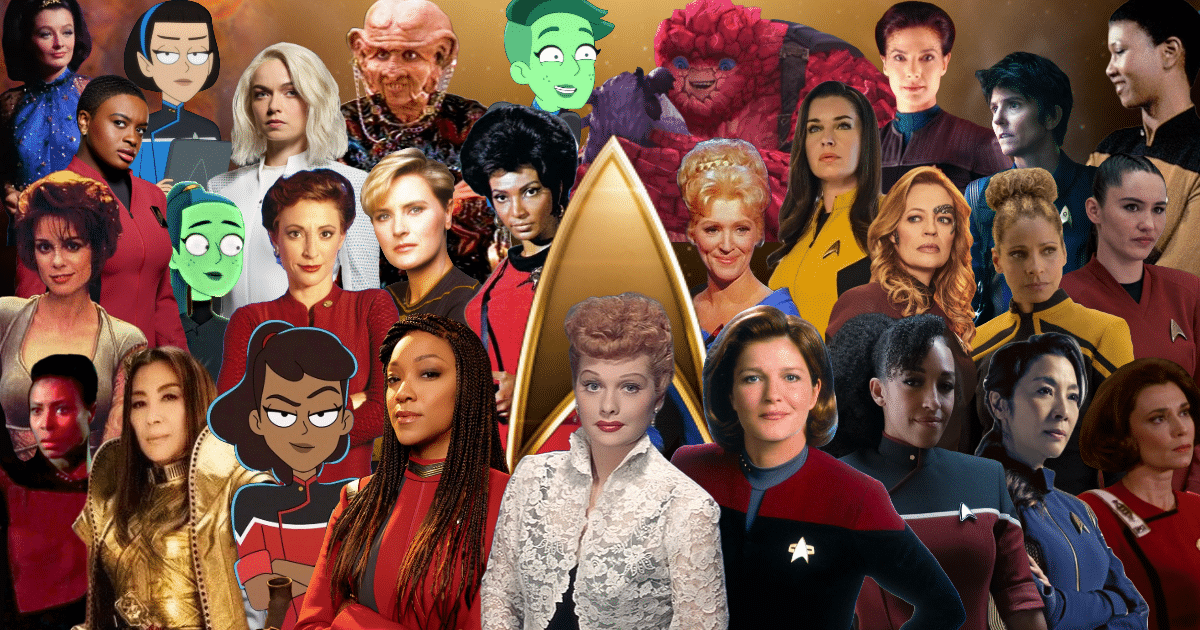In advance of the antepenultimate episode of Star Trek: Prodigy‘s first season, “Mindwalk” (available for streaming now on Paramount+), Comics Beat got the opportunity to catch up with legendary actor John Noble, who plays the show’s increasing complicated antagonist: the time-traveling Vau N’Akat crusader known as The Diviner.
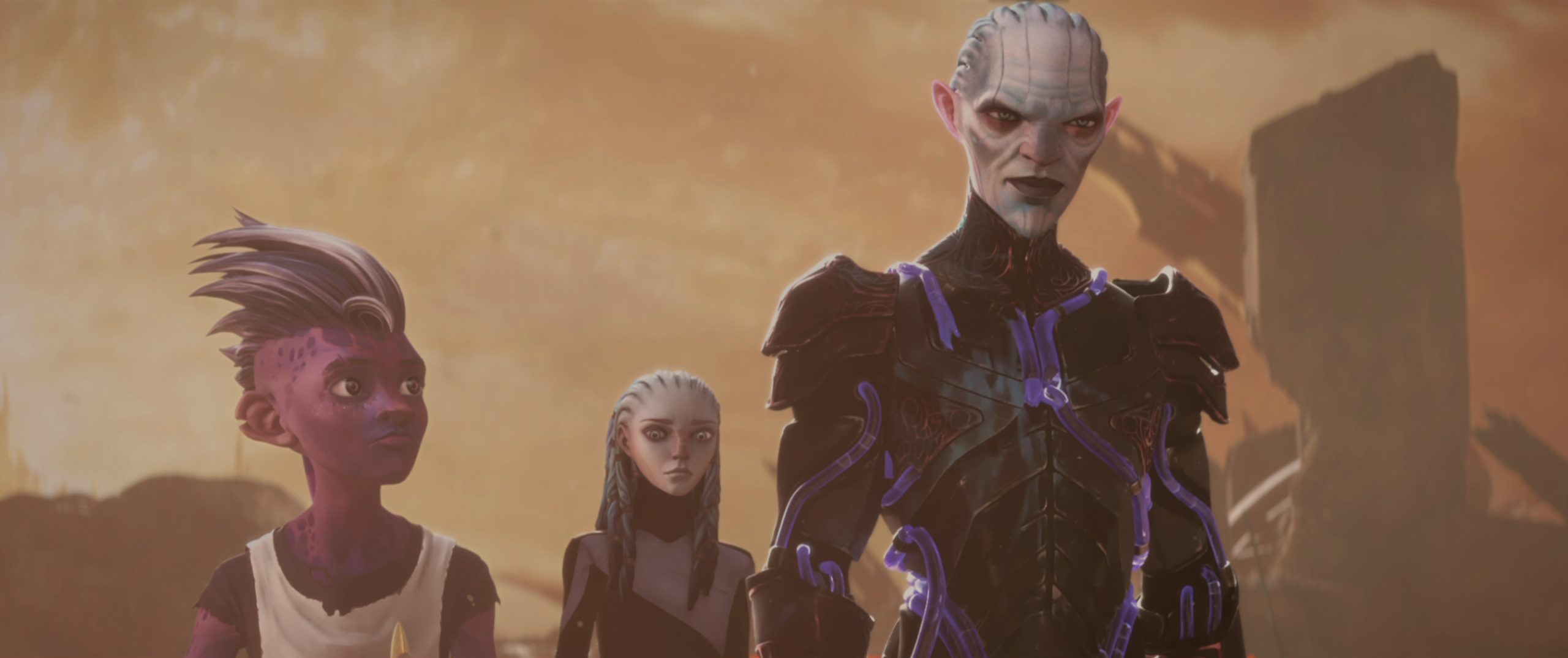
The Beat lept at the opportunity to speak with Noble about playing the character. We asked Noble about where The Diviner falls on the good/evil spectrum, what went into bringing the character to life, and whether or not any classic characters inspired his performance!
This interview has been edited for length and clarity.
AVERY KAPLAN: How did you come to be involved with Prodigy?
NOBLE: You see, this particular producer, Alex Kurtzman – a man that I’ve worked with a couple of times, actually. I can’t remember if it was in Australia or here – anyway, I got a call to do this. It was recommended by him, and I knew some of the other producers as well. They asked me if I’d be interested in doing it, and [series creators] Kevin and Dan Hageman wanted me to do it, so.
It was really done through phone calls, not even pushed through agents. We just did it – I got into Sleepy Hollow the same way, with the same producer. That was when I was in Australia, and he said, “Can you come back and do this?” And I said, “All right,” because he’s so brilliant, and I love him.
And that’s how it happened.
KAPLAN: You’ve played characters across the good and evil spectrum (and good and evil versions of the same character). In your opinion, where does The Diviner fall on the good/evil continuum?
NOBLE: It depends if you’re talking his internal truth, or what appears to be his truth. I guess we’re talking what appears to be his truth.
His own internal truth: pure as the driven snow – I believe that it is. Obsessively so. But the audience has probably thought, “Well, he’s a grumpy old man.” [In The Diviner’s voice:] “A grumpy old fellow.” With a big, deep voice. Perception would be that he’s a bad one.
I play him, always, that he’s playing his truth. Always, always. So I don’t have any doubts about that. And we’re all multifaceted. We have many faces. We can be angry, we can be loving. All these things can happen. And we see that side to him, and we see a softer side later. He can become many things.
It was a theme that we explored a lot during Fringe, the duality. In fact, we played the dual characters in that one. And it was fascinating to get to ask “what would happen if,” like Sliding Doors. “What would happen if I decided that instead of that, or that instead of that.”
That’s always fascinated me, and I think this is another example of it now. So it keeps me interested, I must say… It’s up to Dan and Kevin whether to bend it towards the adult audience or keep it with the kids audience. But they’re incredibly bright people, they’ll make the right decision. I know this of them, I know this of all of them. Brilliant people.
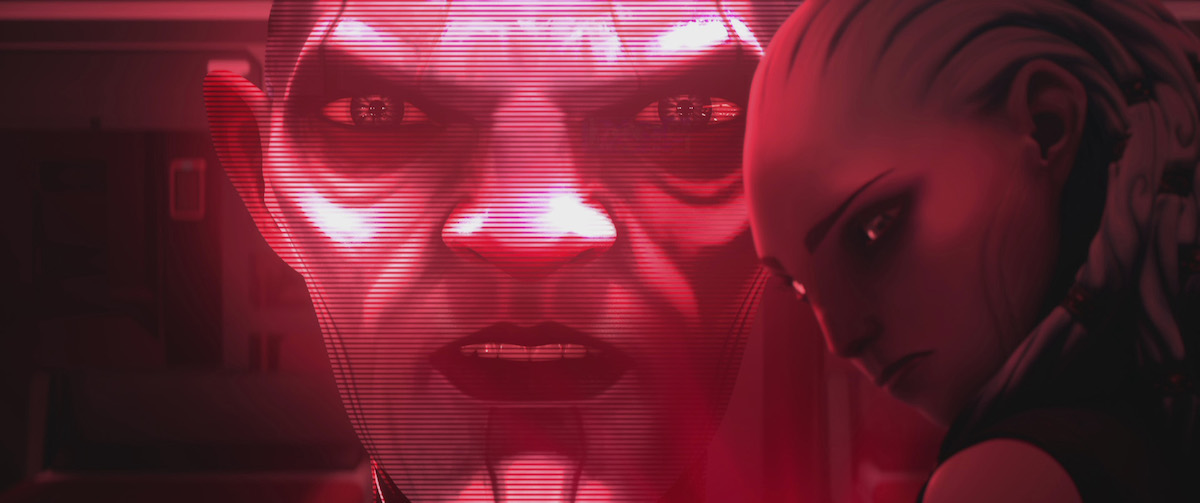
KAPLAN: Are there any particular historical or literary characters that inform your performance as The Diviner?
NOBLE: At a certain stage, I’m always drawn back to some of the tragic characters. In William Shakespeare, for example, I think about the great tragic characters of King Lear, and so forth.
And I do, because there’s great, huge truths within them, those influences. If you’re playing a character’s truth – this is where it gets to truth. I never think of a character as a bad or a good or anything. I think, “they’re playing their truth.” And that’s all I’ve done with this fellow.
The manifestation of him, of course; the voice is down here and grumbling. The manifestation is interesting, but my truth does and must remain constant, or I’ll give up the business. Seriously. Couldn’t do it.
KAPLAN: What is the recording process like for you?
NOBLE: It was remarkable, because I don’t live in Los Angeles, where it’s put together. So we link up into… I mean, I’ve recorded an episode in Auckland and in Sidney, and I live in Texas, so I’ve recorded most of them from here. All of the rest of them, I think, from here. Maybe one other from somewhere else.
But the recording, it’s wonderful, because I go online. And the producers are all there waiting, and it’s just like we’re in a room together, except I was a little square box. Which is great, because I could perform without seeing anyone. Like the technician is out on the other side of the glass.
So I was able to continue on as if nothing had happened, when of course, we all had closed down. So that was my recording experience.
KAPLAN: What was developing the character like?
NOBLE: The characters were figured out before we get there, by the writers. And they’ll give us briefs of how they see it. I usually come in with, I’d say, a few prepared voices. But that’s what it is – because you can only do so much with your voice. And I’d offer them up and they’d choose, and once chosen, we’d lock that in as “the voice of so-and-so.”
And sometimes, in long recording sessions, you have to go, “Can we go back to what that voice is like?” You know, “Can you play that again for me? Because it was six months ago.” I did a game called Batman: Arkham Knight. And that one, we recorded it over two years. We’d go back in and say, “What was going on here? What did I sound like?”
Recording is wonderful. Provided you know how to do it. I was hopeless when I started in recording. I was a young fella, and some radio producer heard me speaking, and he said, “Oh, you’ve got a voice. Do a test for me.”
And oh, I was nervous. But I went into his studio, and I thought: “I know what to do. I’ll put on my Radio Announcer’s Voice.” And so I was delivering this stuff with my Radio Announcer’s Voice and they were like, “oh no, no, John, just talk to us.” “I AM, I’LL TALK TO YOU NOW.”
That was a very unsuccessful tryout. Except it wasn’t, because it taught me a lot. I went to a friend of mine, who was a very good voiceover artist. I said, “What do you do? What are you doing in there?” And he said, “Oh, I just act.” So just completely, physically – raising your arms if you want to, raising your level, doing whatever you want to do. “Yes, that’s what I do.” What a truth that was!
So you leave the technicals to the technical people, and deliver the performance. And they’ll find you – wherever, film and television and radio, they’ll find you, because they’re very gifted at that.
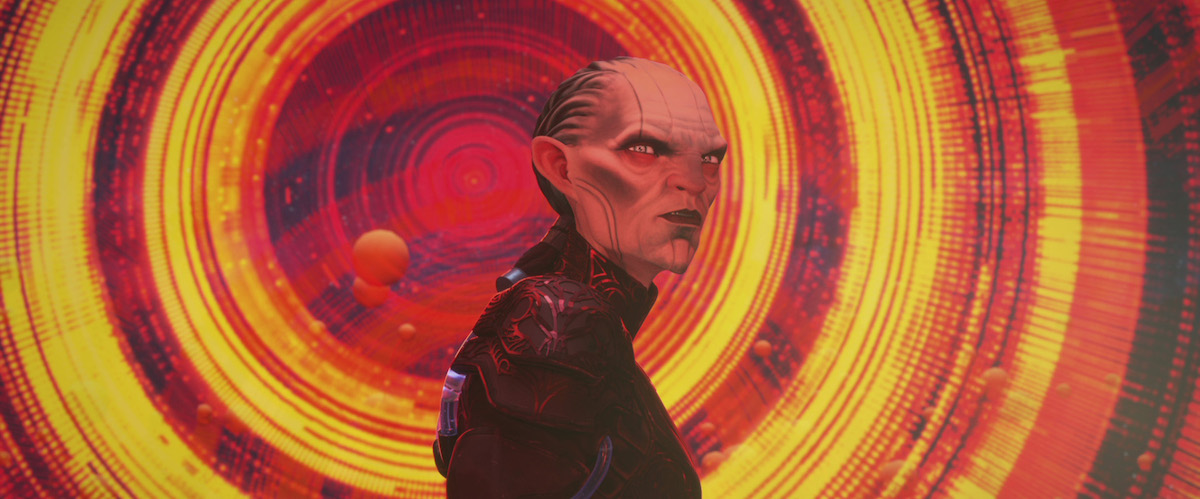
KAPLAN: Is there any message or moral that you hope the younger viewers will take away from the series?
NOBLE: Look, what we have is a group of disparate young people who become the center of an international – intergalactic issue. That is important, because it shows that young people working together are incredibly powerful.
And I’ve witnessed this, with my grandson, what can happen when they work together. Let me give you an example: a couple of nights ago, my 11-year-old grandson – he’s just joined middle school, and he got into the band, playing trumpet. This was four months ago.
The other night, there was a recital for this band – lots of kids, playing all the instruments. It was mesmerizing! I wasn’t the only one asking, “how the hell did they do that?” But working together, they created a full orchestral sound, which was beautiful and flawless. That’s young people working together. It wouldn’t have happened if there wasn’t synergy, I’d tell you!
Young people: you’re not powerless. You don’t have all the power, but you do have more power than you probably think. Provided we can keep using that power in a respectful way – that’s important, to respect parents, and so forth.
But ah, the imagination of young people! I have another grandson who gets lost all the time. You get down on the floor with all of his things – absolutely mesmerized. And he talks. He narrates the whole thing, with all these difference voices for the different characters, or whatever it is. And if you speak to him, he’s not there, at all – so focused. I love to see that, I love to see that in the kids.
My daughter teaches young people, and sometimes I step in to see what they’re doing. And it’s amazing, what these young people can do! Seriously.
We need to encourage this, and not to squash them down and to have them exposed to ignorance. And I don’t think it’s a good idea to have them exposed to extremes, obviously. But ignorance is the greatest sin, you know? Not having information available, or not being allowed to use it.
And this time, it is all available, and they can all access it, provided certain bodies don’t put any more restrictions on them. That’s all there for them, so they have this incredible school situation. They have the availability of anything you want to know, through the internet – seriously!
It’s amazing! And they also have complete entertainment centers, they can get buried in. What else do I want to say about them?
That they are the leaders! That they are the leaders, coming up. There’s going to be leaders and followers and so forth, within them. And they think this is our world. This previous generation still thinks my generation own the world. It’s not true. It’s not our world, because once they get to 18, 19, 20, it’s their world. And they’re responsible for all the screw-ups, not us!
It’s also encouraging to think, “God, we could have a say.” We’ve discovered things at all sorts of levels with voiceless groups suddenly having a voice. It’s just wonderful to watch, isn’t it?
So that’ll happen, and these kids will be leaders. And god willing, they’ll lead us to a path of dignity and grace and humility. Humanity! That’s what I hope. And I see it in their eyes.
Anyway, I’d like to that continue, and I’m very proud of it if our show helps. You might need to have a PhD in science come in one day and give a tutorial… I had that in Fringe once! I was doing something that was really complicated, and I knew it feasibly possible. So they brought down a mathematician from Harvard to go through it with me, and he did, and it was great. You wanna know, you gotta know!
New episodes of Prodigy are available for streaming on Paramount+ on Thursdays.
Click here to read more of The Beat’s Star Trek Universe coverage.


